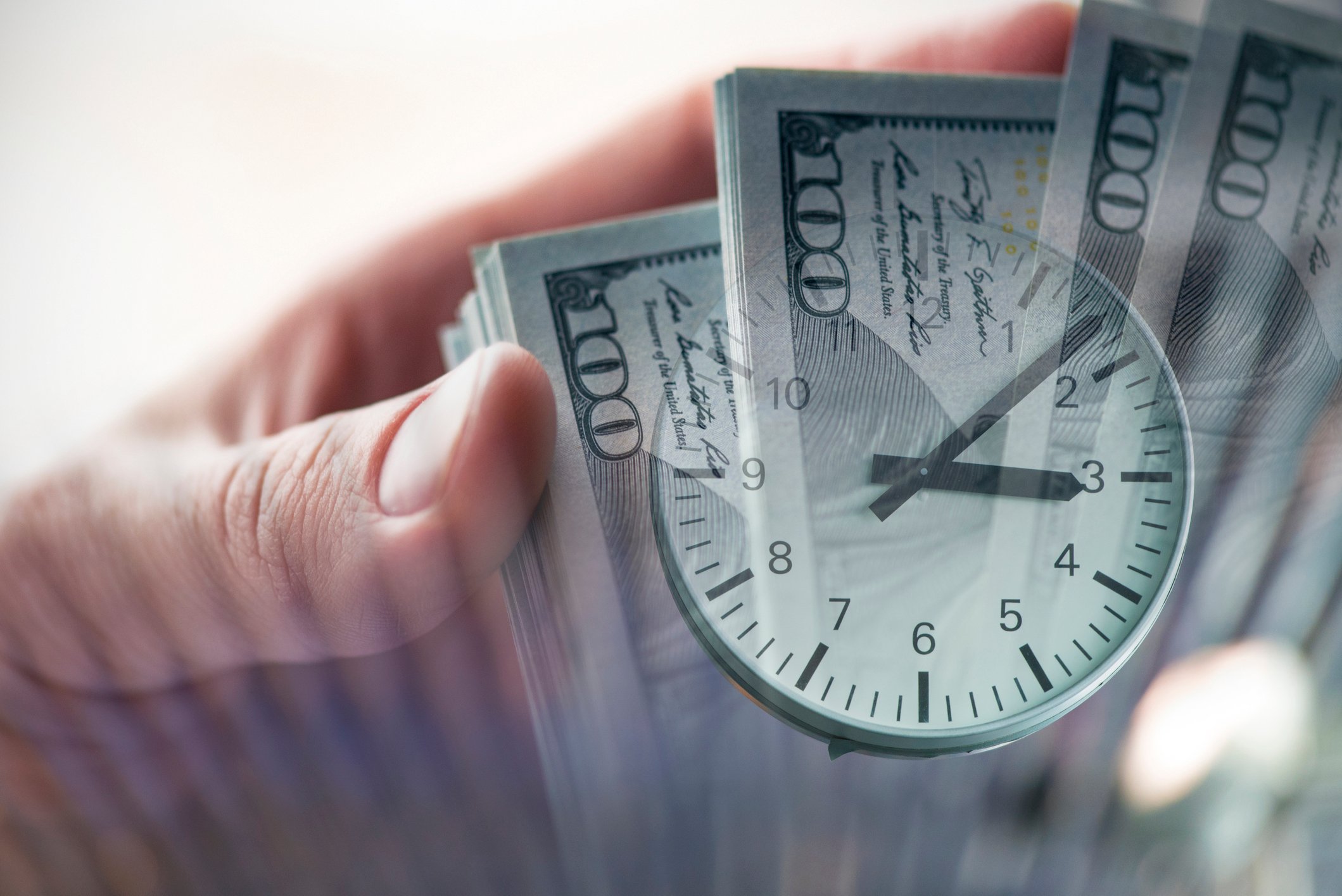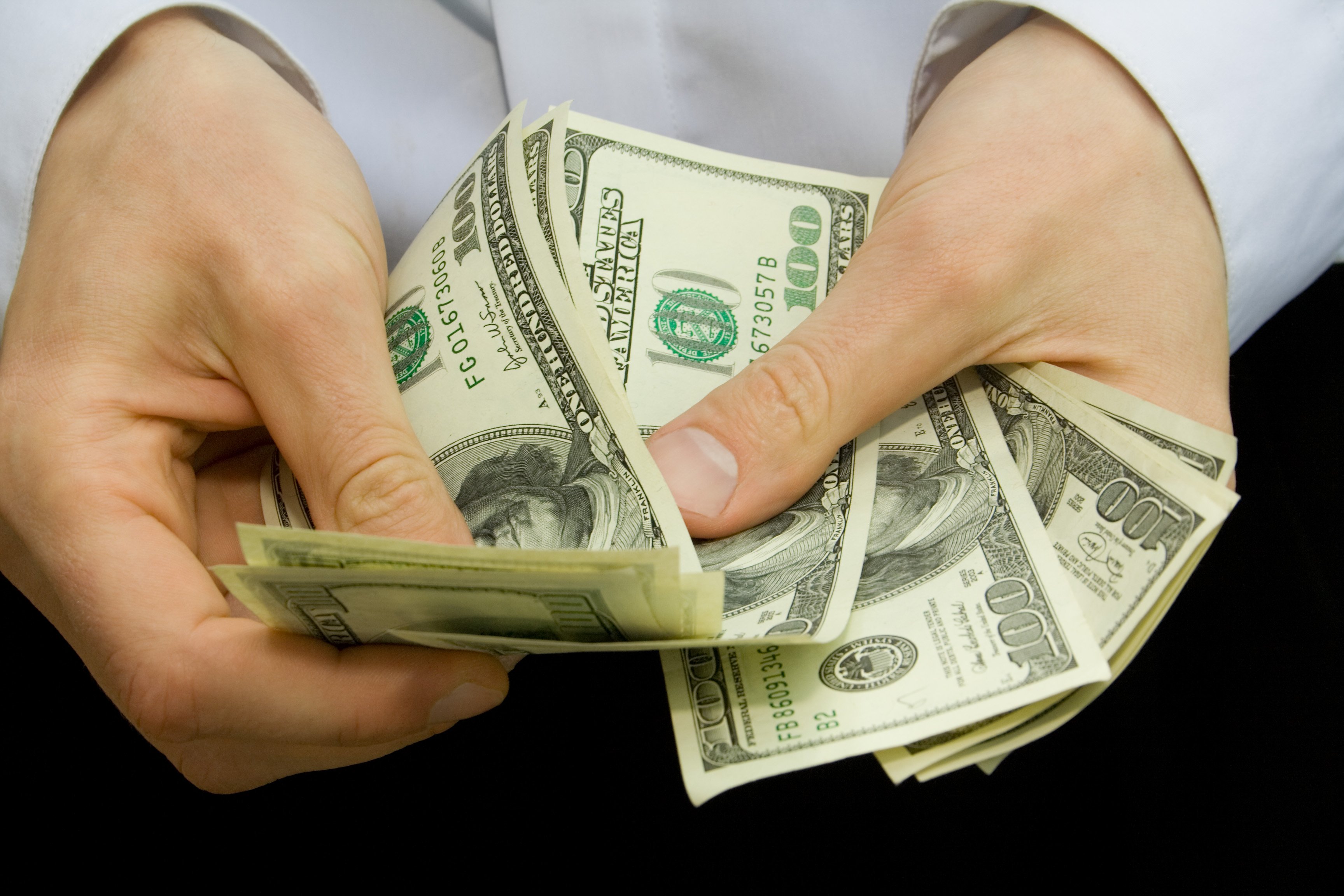I believe I speak for everyone when I say, "Goodbye, March, and good riddance!"
The spread of the coronavirus disease 2019 (COVID-19) has elicited panic on Wall Street, with mitigation measures put in place in various states and cities throughout the U.S. expected to have a negative impact on economic activity and possibly lead to a recession. While these measures are necessary to save lives and prevent our healthcare system from becoming overwhelmed, the uncertainties surrounding the coronavirus wound up pushing the stock market into bear market territory faster than at any time in history. It also sent the 123-year-old Dow Jones Industrial Average to its worst first quarter... ever!
However, there are better days ahead.

Image source: Getty Images.
Better days lie ahead
For one, drug developers around the world are working diligently on antiviral vaccines and therapeutic combinations that could be effective in fighting or minimizing the impact of this respiratory illness that's claimed more than 42,100 lives, as of March 31, 2020. There will, eventually, be a solution to help folks fight back against COVID-19.
Secondly, investors can take solace in knowing that each and every bear market in history has been a surefire buying opportunity. Even taking the market's many corrections into account, the benchmark S&P 500 has still returned an average of 7% per year, inclusive of dividend reinvestment. This means long-term investors will double their money about once a decade, on average. This is why the current bear market, no matter how frightening it may appear in the short-term, might be a once-in-a-generation investment opportunity.
And third, most Americans have a stimulus check on the way. The passage of the Coronavirus Aid Relief, and Economic Security Act apportioned $300 billion to send checks of up to $1,200 to taxpayers with less than $75,000 in adjusted gross income (AGI). Taxpayers between $75,000 and $99,000 in AGI will receive a reduced stimulus check.
Three ridiculously cheap stocks to buy with your stimulus check
For some people, this stimulus check is very much needed to help pay bills or bolster their emergency fund. But for others, an up to $1,200 stimulus check could be the perfect opportunity to go shopping for dirt cheap stocks. With Wall Street being especially mindful of value during this steep downturn in the market, here are three of the cheapest stocks you can consider buying now with your stimulus check.

Image source: Getty Images.
Teva Pharmaceutical Industries
In terms of forward price-to-earnings ratio, there just about isn't a cheaper stock right now than branded and generic-drug developer Teva Pharmaceutical Industries (TEVA +2.04%). Even with the recent bounce it's received as a producer of hydroxychloroquine -- the experimental anti-malarial drug that's being tested in combination with Azithromycin as a treatment for COVID-19 – Teva is still valued at less than 4 times next year's consensus earnings per share, according to Wall Street.
There's no doubt that Teva has been put through the ringer over the past three years, with the company settling bribery charges, losing sales exclusivity on its best-selling branded drug (Copaxone), and now facing a 44-state lawsuit over the role it played in the opioid crisis. Yet, it looks as if Teva has more than paid its penance.
Since taking over as CEO, turnaround specialist Kare Schultz has instituted significant cost cuts and has pushed Teva beyond its suspected trough. By the end of 2020, Teva should see a full $3 billion lopped off of its annual operating costs, and the company will likely have reduced its net debt by $8 billion. This doesn't mean Teva is anywhere near finished with regard to lowering its debt levels of refinancing its existing debt, but it's no longer in the financial vice it was, say, 2.5 years ago.
Wall Street also seems to be overlooking how highly profitable and predictable the drug industry can be. Since people don't get to choose when they get sick or what ailment(s) they develop, there's always a need for brand-name and generic drugs. If anything, the coronavirus panic could actually lead to improved pricing power for Teva's line of generics.
Investors in Teva should be handsomely rewarded for their patience many years down the road.

Image source: Getty Images.
Discover Financial Services
Within the financial space, there's arguably not a cheaper stock that investors could buy with their stimulus check than Discover Financial Services (DFS +0.00%). Investors buying right now are paying roughly 4.5 times Wall Street's consensus earnings for 2021, as well as 98% of its book value. For context, this is a company that was valued at nearly 2.5 times book as recently as last summer.
There are, obviously, going to be some near-term challenges for Discover, which acts as both a payment facilitator and a lender. The company's peers have already noted softness in the purchasing volume crossing their networks in recent weeks. Further, there's the growing likelihood that rising unemployment rates, even in the short-term, could lead to an increase in credit delinquencies.
But it's not all bad news. For instance, the stimulus checks being mailed out should create a temporary surge in economic activity that improves payment processing revenue, and perhaps even curtails credit delinquencies. It's worth noting that when the financial crisis struck, Discover saw the smallest drop-off in credit card network purchase volume, relative to other major payment facilitators.
What's more, the Federal Reserve's stringent oversight following the financial crisis has set up banks and lenders to be better prepared for recessions. As of the end of the third quarter, Discover Financial Services had a liquidity coverage ratio (LCR) of 195%. The LCR is a measure of highly liquid assets relative to cash outflows over the next 30 days.
The ride could be a bumpy in the near-term, but Discover looks well-positioned to succeed over the long run.

Image source: Getty Images.
American Eagle Outfitters
Another of the cheapest stocks that investors can consider buying with their stimulus check is teen and young-adult-focused retailer American Eagle Outfitters (AEO 2.56%). Even with retail estimates coming down across the board, American Eagle and its forward price-to-earnings ratio of 6 stand out as a deep discount.
Although it's a streak that'll undoubtedly come to an end because of the coronavirus, American Eagle Outfitters reported in the fourth quarter that its flagship American Eagle stores have delivered 20 consecutive quarters of positive comparable-store sales growth, while its intimate brand Aerie has produced 21 straight quarters of double-digit comp-sales growth. Considering how e-commerce companies have tortured brick-and-mortar retailers in recent years, these results demonstrate the importance of a sound management team and having the right product in its stores.
Perhaps one of the more under-the-radar reasons to buy into American Eagle Outfitters is management's success in managing inventory. Having worked in retail, I know that not all merchandise is going to be a hit. This company consistently moves unwanted merchandise faster than any specialty mall retailer I've seen, meaning discounting doesn't become a multi-quarter drag on performance.
Management is also pushing for the opening of 60 to 70 new Aerie stores in 2020, although this could change based on COVID-19. The point being that it's clear what portion of the company is currently driving growth, and management will continue to promote intimate brands if its means an ongoing double-digit growth rate.
Given American Eagle's nearly 7% yield and no debt, stimulus check recipients would be wise to nab this retail stock off the clearance rack.







